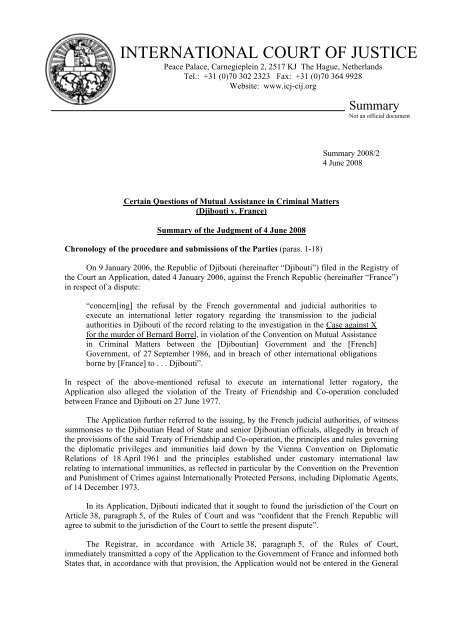Letters Rogatory vs. Mutual Legal Help Treaties: Key Differences Explained
Letters Rogatory vs. Mutual Legal Help Treaties: Key Differences Explained
Blog Article
Letters Rogatory Explained: Facilitating Legal Teamwork Between Countries

Interpretation of Letters Rogatory
Letters rogatory are official demands made by a court in one jurisdiction to a court in one more territory, looking for aid in acquiring proof or statement for a legal proceeding. This procedural system is vital in the context of global law, where legal systems might vary, and cross-border collaboration is needed. Letters rogatory facilitate the event of info that might be essential for adjudicating situations, specifically in instances involving complicated multinational concerns.
Typically, these requests develop in civil, criminal, or management issues where an event calls for evidence that lies outside the jurisdiction of the requesting court. The letters act as a way to make sure that the concepts of due procedure are promoted, making it possible for courts to accessibility proof that could otherwise remain unattainable because of legal or geographical obstacles.
Using letters rogatory is regulated by worldwide treaties, reciprocal contracts, or domestic legislations, which define the procedures and obligations of the courts involved. It is necessary to note that the execution of such demands is not assured; they rely on the regulations and methods of the territory obtaining the letter. Thus, letters rogatory are an essential device for fostering legal teamwork and making sure justice throughout borders.
The Process of Issuing Letters Rogatory
Issuing letters rogatory entails an organized process that makes sure conformity with both residential and worldwide lawful requirements. At first, the requesting event, commonly a court or lawful authority, prepares an official demand describing the nature of the help sought, the proof or info needed, and the lawful basis for the request. This record needs to be precise to promote understanding by the foreign jurisdiction.

The next action includes sending the letters rogatory to the marked foreign authority. This is typically done with diplomatic networks or global lawful help frameworks, guaranteeing that the request is obtained and recognized by the foreign court. The foreign court after that refines the request according to its very own lawful procedures, ultimately responding to the asking for celebration with the popular information or proof, therefore helping with international lawful teamwork.
Significance in International Law
The significance of letters rogatory in global legislation can not be overstated, as they act as a vital system for judicial cooperation throughout borders. These official requests for assistance in lawful matters permit courts in one jurisdiction to look for info, evidence, or the existence of witnesses from another territory, consequently assisting in the management of justice in transnational instances.
Letters rogatory are especially vital in the context of globalization, where lawful disputes commonly span several countries. They allow the find this collection of proof that may or else be inaccessible, making certain that legal procedures are informed and fair. By cultivating collaboration in between judicial systems, letters rogatory aid support the guideline of regulation and promote common respect among countries.
In addition, using letters rogatory shows a dedication to international standards and concepts of collaboration, mirroring the interconnected nature of modern legal methods. It highlights the importance of adhering to well-known procedures and treaties, such as the Hague Convention, which offers a framework for these demands - Letters rogatory. Eventually, letters rogatory boost the efficiency of legal procedures, making sure that justice is not impeded by geographical limits
Obstacles and Limitations
In spite of their value, letters rogatory face several difficulties and her response constraints that can impede their efficiency. One primary concern is the differing legal structures and treatments throughout territories, which can bring about misconceptions and hold-ups in the implementation of demands. Different countries may have unique demands for the credibility of letters rogatory, making complex the procedure additionally.
In addition, the frequently drawn-out nature of worldwide legal teamwork can impede prompt accessibility to evidence or witnesses. This delay may adversely impact continuous investigations or legal proceedings, especially in cases needing immediate action. The lack of resources and training in some territories can result in inadequate handling of requests, leading to incomplete or poor responses.
Social differences and varying perspectives in the direction of legal procedures can likewise position significant obstacles. Countries with much less formal lawful systems might struggle to abide with the procedural rigor anticipated in letters rogatory. Political stress between countries can affect the desire to execute requests, resulting in an absence of collaboration and lessening the utility of this system in international legislation. These obstacles necessitate constant discussion and reform to enhance the efficacy of letters rogatory in legal cooperation.
Study and Instances

Conversely, challenges can emerge, as seen in an instance including a European nation seeking proof in a recurring criminal matter from a non-EU nation - Letters rogatory. The process was delayed because of administrative difficulties and varying lawful standards, eventually preventing the investigation
These instances show that while letters rogatory can help with worldwide participation and expedite lawful procedures, they likewise highlight the need for clear interaction and understanding of legal frameworks between nations. Such study highlight the significance of refining this tool to boost performance and performance in international lawful issues.
Final Thought
In recap, letters rogatory work as an important system for facilitating legal collaboration between nations, making certain the collection of evidence and statement throughout jurisdictions. Their relevance in get redirected here international regulation can not be overstated, as they advertise due process and enhance the efficiency of cross-border lawful proceedings. Challenges such as differing legal structures and political stress may prevent their performance. Proceeded efforts to enhance and boost the process are necessary for cultivating stronger global judicial partnership.
Letters rogatory are official demands made by a court in one jurisdiction to a court in another territory, seeking aid in acquiring proof or testament for a legal case. The asking for celebration, generally a court or legal authority, composes a formal request outlining the nature of the help looked for, the evidence or info required, and the lawful basis for the request. The foreign court after that refines the demand according to its very own lawful procedures, eventually reacting to the asking for event with the popular details or evidence, hence assisting in global lawful cooperation.
Furthermore, the use of letters rogatory shows a commitment to international norms and concepts of participation, showing the interconnected nature of contemporary legal methods.International lawful collaboration through letters rogatory is not without its real-world implications, as highlighted by various case studies that highlight both successes and obstacles.
Report this page